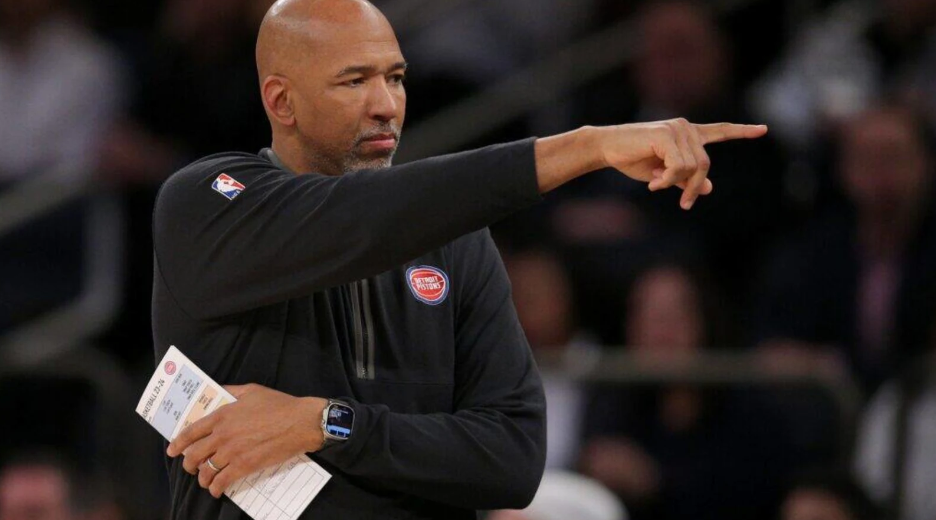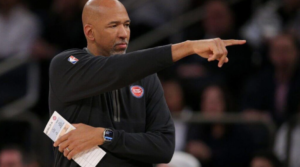
Cracking the Code: Constructing The Best Pistons Draft Pick Team

The draft history of the Detroit Pistons has been a mix of successes and missed opportunities, showcasing the front office’s talent in spotting promising players but also the challenge of retaining and developing them fully. Many players have found success with other teams, either due to early departures or the team undergoing rebuilding phases. This underscores the importance of strong coaching and patience in nurturing players to realize their true potential.
As we observe these players excelling in the NBA with other teams, it’s intriguing to contemplate the possibilities had they stayed with the Pistons. Let’s construct a starting lineup for the Pistons using draft picks since the year 2000, sparking excitement and interest in this thought-provoking exercise.
Cracking the Code: Constructing The Best Pistons Draft Pick Team
Point Guard: Spencer Dinwiddie
Selected as the 38th overall pick by the Detroit Pistons in 2014, Spencer Dinwiddie assumes the role of the starting point guard in our lineup. Dinwiddie honed his skills at the University of Colorado, where his impact on the team was significant. Despite a setback due to a torn ACL during his junior year, Dinwiddie’s versatility was evident throughout his college career, averaging 13.0 points, 3.3 rebounds, 2.6 assists, and 1.1 steals over three seasons.
Dinwiddie’s stint with the Pistons lasted only 46 games before he was traded to the Chicago Bulls. It was with the Brooklyn Nets, who signed him in December 2016, that he found his opportunity to shine in the NBA. Throughout his decade-long NBA career, Dinwiddie has maintained solid averages of 13.3 points, 3.0 rebounds, and 5.2 assists per game. His success serves as a testament to the Pistons’ eye for talent while also prompting reflection on their decision to part ways with him early in his professional journey.
Shooting Guard: Khris Middleton
Positioned as the shooting guard after being chosen as the 39th overall pick by the Detroit Pistons in 2012, Khris Middleton stands out. Hailing from Charleston, SC, Middleton, a three-star high school prospect, opted for Texas A&M for his college basketball journey. Despite facing injury challenges, Middleton’s talent and adaptability shone through, with averages of 11.2 points, 4.6 rebounds, 2.0 assists, and 1.0 steals over three collegiate seasons.
The Pistons provided limited playing time to Middleton in his debut NBA season before eventually trading him to the Milwaukee Bucks. Over time, Middleton evolved into a three-time All-Star and played a crucial role in helping the Bucks secure an NBA championship, forming a formidable partnership with Giannis Antetokounmpo. The trade that moved Middleton to Milwaukee is viewed as a substantial missed opportunity by the Pistons.
Small Forward: Tayshaun Prince
Tayshaun Prince, selected as the 23rd overall pick by the Detroit Pistons in 2002, occupied the starting small forward position. Prince attended the University of Kentucky, where he had an outstanding college basketball career. During his time with the Wildcats, he achieved a remarkable 97-39 record and participated in the NCAA tournament each year. Prince stood out in his junior season by winning the SEC Player of the Year title and earning a place on the Associated Press All-SEC team in both his junior and senior years. His tenure saw the Wildcats clinch two SEC titles in 1999 and 2001, with Prince also being recognized as the tournament MVP in 2001.
Although Prince played in only 42 games during his rookie NBA season, it was the 2003 playoffs that truly showcased his abilities. Coach Rick Carlisle strategically placed Prince into the rotation when the Pistons were trailing three games to one against the Orlando Magic. Prince’s impact was significant as he excelled on both offense and defense, averaging 13.3 points and 5.0 rebounds with impressive shooting percentages of 54% from the field, 40% from beyond the arc, and 77% from the free-throw line. He also showcased outstanding defensive skills while guarding Tracy McGrady.
Prince’s remarkable playoff performance cemented his role as the Pistons’ starting small forward. Over the following six years, he missed just two games, earned All-Defensive team honors four times, and secured an NBA championship in 2004. He later played for the Grizzlies and the Timberwolves before transitioning to a role in the Memphis Grizzlies front office.
Power Forward: Greg Monroe
Greg Monroe, chosen as the 7th overall pick by the Detroit Pistons in 2010, holds the role of the starting power forward. Hailing from Harvey, Louisiana, Monroe was a highly-rated prospect and attended Georgetown University, where he showcased his talent over two standout seasons. He was recognized as the Big East Rookie of the Year in his freshman year and received numerous accolades in his sophomore year, such as being selected for the All-Big East First Team and earning a spot on the Associated Press NCAA All-American Third Team. Upon concluding his time at Georgetown, Monroe departed with solid career averages of 14.5 points, 8.2 rebounds, and 3.2 assists per game in 32.6 minutes of play.
During his five-year tenure with the Pistons, Monroe maintained impressive statistics, averaging 14.3 points, 9.2 rebounds, 2.3 assists, and 1.2 steals per game. He was recognized by the NBA with a placement on the All-Rookie Second Team and contended for both the Defensive Player of the Year and Most Improved Player awards in the 2011-12 season. Monroe joined Grant Hill as only the second Piston to achieve 1,000+ points and 600+ rebounds in consecutive seasons. Despite his strong contributions, the Pistons encountered challenges in assembling a competitive team around him, leading to Monroe’s decision to sign with the Milwaukee Bucks in 2015. He later had playing stints with the Suns, Celtics, and Raptors.
Center: Andre Drummond
Andre Drummond, selected as the ninth overall pick by the Detroit Pistons in 2012, holds the role of the starting center. Originally from Mount Vernon, New York, Drummond was a highly sought-after prospect who attended the University of Connecticut for a single season, where he put up averages of 10.0 points, 7.6 rebounds, and 2.7 blocks per game. His impressive performance in college highlighted his potential as a dominant force in the paint.
Over the course of eight seasons with the Pistons, Drummond established himself as one of the league’s top rebounders. Throughout his time in Detroit, he averaged 14.4 points, 13.9 rebounds, 1.3 assists, and 1.6 blocks per game. Drummond led the NBA in rebounding on four occasions and secured two All-Star selections. Despite his individual accomplishments and defensive skills, the Pistons encountered challenges in achieving consistent team success. In 2020, Drummond was traded to the Cleveland Cavaliers by the Pistons. Following his time with the Cavaliers, Drummond went on to play for the Los Angeles Lakers, Philadelphia 76ers, Brooklyn Nets, and Chicago Bulls.
Missed Opportunities and Lessons Learned
The Detroit Pistons’ challenges in the draft can be traced back to decisions made by management, fluctuations in coaching staff, and shifts in team dynamics. For instance, the trades involving Dinwiddie and Middleton took place under various front-office leaderships, indicating a lack of continuity in the team’s long-term strategy. Consistent coaching stability has been crucial for player growth. In the cases of players like Monroe and Drummond, the team struggled to construct a competitive roster around them. The incoming leadership at the Pistons needs to prioritize making sound decisions to avoid prematurely trading away players who could potentially achieve significant success in the future.
The Last Word
The draft history of the Detroit Pistons showcases a mix of notable successes and instances where potential was not fully realized. Players such as Spencer Dinwiddie, Khris Middleton, Tayshaun Prince, Greg Monroe, and Andre Drummond exemplify the team’s talent identification capabilities. However, the task of retaining and developing these players to maximize their impact within the team has proven to be a challenge. With excellent coaching and a supportive front office, the Pistons have the opportunity to transform past missed chances into future triumphs, revitalizing hope for the franchise.

Leave a Reply